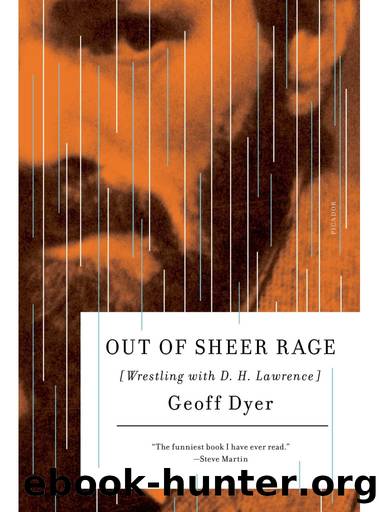Out of Sheer Rage: Wrestling with D.H. Lawrence by Geoff Dyer

Author:Geoff Dyer [Dyer, Geoff]
Language: eng
Format: azw3
Tags: Biography & Autobiography, Essays, Literature, Nonfiction, Humour
ISBN: 9780857863393
Publisher: Canongate Books
Published: 0101-01-01T00:00:00+00:00
Bruce Chatwin doesnât even get near to that kind of responsiveness and suggestiveness in the three hundred pages of The Songlines.
âHave you noticed how often a writerâs letters are superior to the rest of his work?â wonders Comtesse dâArpajon in Remembrance of Things Past. She had in mind Flaubert (though his name escaped her at the time). I tend not only to agree but to wonder if this remark might not be prophetic. Could my own preference for writersâ â not just Lawrenceâs â notes and letters be part of a general, historical drift away from the novel? For Lawrence the novel was âthe one bright book of lifeâ, âthe highest form of human expression so far attainedâ. Nowadays most novels are copies of other novels but, for Lawrence, the novel still contained these massive potentialities. Marguerite Yourcenar offers an important qualification to this idea when, in her notes on the composition of Memoirs of Hadrian (a text of far greater interest, to me, than the novel to which it is appended), she writes that âIn our time the novel devours all other forms; one is almost forced to use it as a medium of expression.â No more. Increasingly, the process of novelisation goes hand in hand with a strait-jacketing of the materialâs expressive potential. One gets so weary watching authorsâ sensations and thoughts get novelised, set into the concrete of fiction, that perhaps it is best to avoid the novel as a medium of expression.
Of course good, even great, novels continue to be written but â as someone remarks every twenty years or so â the moment of the formâs historical urgency has passed. Part of the excitement of reading Lawrence comes from our sense of how the potentialities of the form are being expanded, forced forwards. That feeling is now almost wholly absent from our reading of contemporary novels. If the form advances at all it is by increments, not by the great surges of the heyday of modernism.
Milan Kunderaâs faith in the novel is the equal of Lawrenceâs but the logic of his apologia for the form actually carries him beyond it. Kundera takes inspiration from the unhindered exuberance of Rabelais and Sterne, before the compulsive realism of the nineteenth century. âTheir freedom of compositionâ set the young Kundera dreaming of âcreating a work in which the bridges and the filler have no reason to be and in which the novelist would never be forced â for the sake of form and its dictates â to stray by even a single line from what he cares about, what fascinates himâ. Kundera duly achieved this in his own fictions, the famous novels âin the form of variationsâ. In his âNotes Inspired by The Sleepwalkersâ, meanwhile, Kundera paid tribute to Broch who demonstrated the need for âa new art of the specifically novelistic essayâ. Novels like Immortality are full of âinquiring, hypotheticalâ or aphoristic essays like this but compared with these, my favourite passages, I found myself indifferent to Kunderaâs characters.
Download
This site does not store any files on its server. We only index and link to content provided by other sites. Please contact the content providers to delete copyright contents if any and email us, we'll remove relevant links or contents immediately.
Machine Learning at Scale with H2O by Gregory Keys | David Whiting(4295)
Never by Ken Follett(3937)
Harry Potter and the Goblet Of Fire by J.K. Rowling(3848)
Unfinished: A Memoir by Priyanka Chopra Jonas(3381)
Fairy Tale by Stephen King(3370)
The Man Who Died Twice by Richard Osman(3072)
Will by Will Smith(2911)
Rationality by Steven Pinker(2352)
It Starts With Us (It Ends with Us #2) by Colleen Hoover(2344)
Can't Hurt Me: Master Your Mind and Defy the Odds - Clean Edition by David Goggins(2324)
The Dark Hours by Michael Connelly(2300)
The Storyteller by Dave Grohl(2229)
Friends, Lovers, and the Big Terrible Thing by Matthew Perry(2219)
The Dawn of Everything: A New History of Humanity by David Graeber & David Wengrow(2197)
The Becoming by Nora Roberts(2188)
The Stranger in the Lifeboat by Mitch Albom(2113)
Cloud Cuckoo Land by Anthony Doerr(2099)
Love on the Brain by Ali Hazelwood(2062)
Einstein: His Life and Universe by Walter Isaacson(2011)
